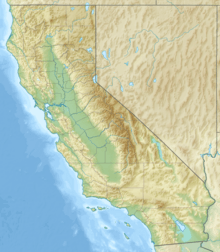Marble Mountains (Siskiyou County) facts for kids
Quick facts for kids Marble Mountains |
|
|---|---|
| Highest point | |
| Elevation | 2,516 m (8,255 ft) |
| Geography | |
| Country | United States |
| State | California |
| Region | Shasta Cascade |
| District | Siskiyou County |
| Range coordinates | 41°34′43.482″N 123°5′31.148″W / 41.57874500°N 123.09198556°W |
| Topo map | USGS Boulder Peak |
The Marble Mountains are a special group of mountains located in northwestern California, in the United States. They are part of a larger mountain range called the Salmon Mountains, which are themselves a smaller part of the Klamath Mountains. The name "Marble Mountains" comes from two important peaks, Marble Mountain and Black Marble Mountain. These peaks are made mostly of marble rock. This area is also home to the amazing Marble Mountain Wilderness Area.
Contents
Exploring the Marble Mountains
A Special Wilderness Area
The Marble Mountain Wilderness is a huge protected area, covering about 242,500-acre (981 km2). It's a beautiful place with lots of forests and 89 lakes. Many of these lakes are stocked with trout, which are a type of fish. Larger streams in the area are home to steelhead trout and salmon. You can also find lots of other wildlife here, like bears and deer.
People have known for a long time that this region is very special and wild. It was first protected in 1931 as a "Primitive area." Later, in 1953, it became a "Wilderness," and in 1964, it officially joined the National Wilderness Preservation System. This system helps protect America's wildest places for everyone to enjoy.
How the Mountains Were Formed
Millions of years ago, the area where the Marble Mountains now stand was actually the flat bottom of a shallow ocean. Over a very long time, powerful forces deep within the Earth caused the land to push up. This was like giant volcanic eruptions. Then, rivers and glaciers (huge sheets of ice) slowly carved and shaped the mountains, creating the peaks and valleys we see today. Marble Mountain itself is mostly made of ancient sea creatures that lived in that ocean long ago. Most of the lakes in the Marble Mountains were also formed by these ancient glaciers.
Amazing Plants and Animals
The Pacific Crest Trail, a famous long-distance hiking path, goes right through the Marble Mountain Wilderness for about 32 miles (51 km). This wilderness is home to an incredible variety of plants, especially trees. You can find more types of cone-bearing trees (called conifers) here than almost anywhere else in the world – 17 different kinds!
Some of the cool trees you might see include:
- Brewer's spruce
- Incense cedar
- Western Juniper
- Different kinds of fir trees like white fir, subalpine fir, and Shasta red fir
- Engelmann spruce
- Mountain hemlock
- Pacific yew
- And many types of pine trees, such as whitebark pine, knobcone pine, foxtail pine, lodgepole pine, sugar pine, ponderosa pine, and Western white pine.
The Marble Mountains also play an important role in the water system of the region. They form part of the areas that drain into the Salmon River, Scott River, and Klamath River.
Getting There
If you want to visit the Marble Mountains, you can reach them by different roads. You can use State Route 96 between Hamburg and Somes Bar. Another way is to take State Route 3 using the Scott River Road between Scott Bar and Fort Jones, or by using the Salmon River Road.


